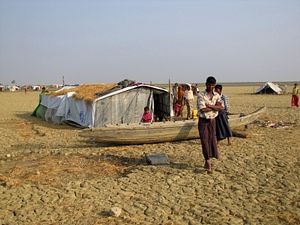Last week, Myanmar and Bangladesh said they had reached a deal for the repatriation of about 600,000 Rohingya refugees. Though the deal has some serious limitations and will likely do very little to ease the overall crisis, it could not have come sooner and will save the Pope and his entourage from the Vatican from potentially messy diplomatic encounters when he starts a visit of both countries this week.
The deal is tentative, and specifics remain unclear. But repatriations are expected to begin within two months, with a memorandum of understanding signed just one day after U.S. Secretary of State Rex Tillerson backed a previous United Nations finding and said “after a careful and thorough analysis of available facts” the violence in targeting the Muslim Rohingya qualified as ethnic cleansing.
Hundreds of thousands of Rohingyas have fled Rakhine state in northern Myanmar since a violent military crackdown was sparked by a militant attack on police posts in August. Naypyidaw does not recognize Rohingya and calls them “Bengali” –- implying they are from Bangladesh despite having lived in Myanmar previously.
The deal was made on the back of a 1992-1993 agreement where Myanmar would accept those who could present identity documents issued to the Rohingya by previous governments. Such documents include national verification cards, the non-current “white cards” and receipts received for the return of “white cards.” But there are doubts over how well such a system would work.
Officials in Myanmar, including State Counselor Aung San Suu Kyi, are well aware that many Rohingya will struggle to meet these conditions given that they simply don’t have the paperwork, or lost their documents while fleeing the military onslaught. And there are very few, if any, people left in their villages anyway, many of them razed.
The Rohingya will also have to provide the names of family members along with previous addresses in Myanmar, birth dates, and a statement of voluntary return.
There are also concerns the military will prove more of a hindrance than a help if and when the Rohingya are returned to Rakhine. This fear is not totally unjustified given the sheer nastiness of the atrocities and scale of the allegations made against Myanmar’s military.
Amnesty International has said “crimes against humanity” occurred amid the latest crackdown including murder, rape, torture and forcible displacement adding that discrimination against the Rohingya amounted to “dehumanizing apartheid.”
The Myanmar military denies the allegations. Still, Suu Kyi, widely discredited by the Rohingya crisis while insisting there is “a huge iceberg of misinformation” being pedaled about the Rohingya – says their return would be “safe and voluntary.”
The deal has been welcomed in most quarters, including by the Vatican and Pope Francis who is also being mentioned for his role in any repatriation by Cardinal Patrick D’Rozario, the Archbishop of Dhaka.
On the eve of the next papal tour, the pope has been under pressure not to use the word “Rohingya” and he is no doubt mindful that Myanmar stands accused of ethnic cleansing.
Fears have also been raised that a diplomatic incident could make the 700,000 Roman Catholics a target in what remains an overwhelmingly Buddhist country of 51 million people.
“I am hopeful the Rohingya can be returned to Myanmar,” D’Rozario told the news wire agency Agence-France Presse. “The international community wants it and the Holy Father’s visit will prepare the minds and hearts of many,” he said.
But not everyone is pleased with the MOU, including Amnesty.
“While precise details of this deal have not yet been revealed, talk of returns is clearly premature at a time when Rohingya refugees continue to trickle into Bangladesh on an almost daily basis as they flee ethnic cleansing in Myanmar,” Charmain Mohamed, director for refugee and migrant rights at Amnesty, said.
Luke Hunt can be followed on Twitter @lukeanthonyhunt

































